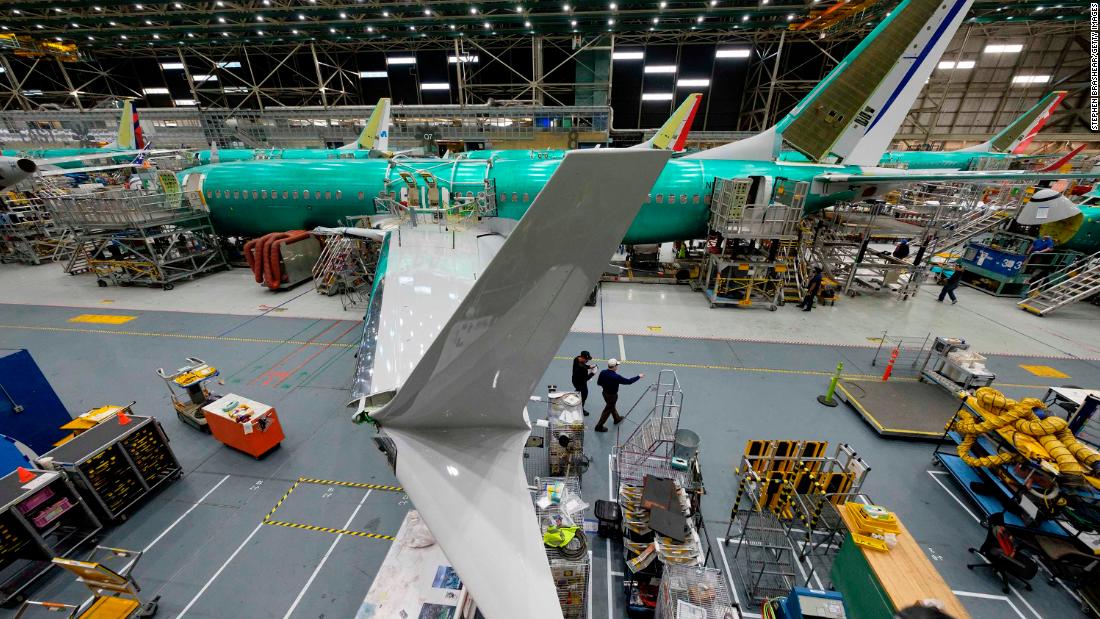
The company reported a net loss of $636 million last year, compared to a $10.5 billion profit it made in 2018.
But its core commercial aircraft operation lost $6.7 billion last year, almost entirely because of Boeing's continued problems with the 737 Max. Revenue for the year plunged 24% because Boeing stopped deliveries of the 737 Max in March.
Boeing said it will pay an additional $2.6 billion to airline customers to compensate them for the grounding, which followed two fatal crashes that killed 346 people.
"We recognize we have a lot of work to do," said Boeing CEO Dave Calhoun in a statement. "We are focused on returning the 737 Max to service safely and restoring the long-standing trust that the Boeing brand represents with the flying public. Fortunately, the strength of our overall Boeing portfolio of businesses provides the financial liquidity to follow a thorough and disciplined recovery process."
But the grounding will cost more than the amount Boeing owes airlines. The cost of producing the jet increased by $2.6 billion during 2019. Boeing had continued to build the Max throughout the year despite not being able to complete the deliveries and get most of the money for the plane from airline customers. It has about 400 completed jets parked in Washington state and Texas awaiting delivery.
Boeing also expects a cost increase of $4 billion in 2020 because of at temporarily shutdown of production earlier this month. Calhoun said last week it expects to restart the line in two or three months even without final approval for the plane to fly again.
All told the 737 Max crisis has cost Boeing more than $17 billion.
Boeing (BA) said last week it did not expect the plane will be approved to fly again until the middle of this year, although the Federal Aviation Administration subsequently said its approval could come before that time. The airlines have been adjusting their schedules, with United Airlines (UAL) executives saying last week that they don't expect to be able to use the plane during the upcoming summer travel season.
Although the 737 Max crisis is Boeing's biggest problem, other issues are dogging the company.
Slides it prepared for an investor call later Wednesday show it plans to record a charge for the Starliner space capsule it is developing for NASA. Starliner will need an additional uncrewed mission after it failed to reach the International Space Station as planned on its most recent flight. The amount of the charge was not indicated.
It also said that global trade tension is putting pressure on the widebody commercial jet market, Boeing's most profitable product. And it said the slowdown in production of the 787 Dreamliner widebody will stretch through at least 2023.
Correction: An earlier version of this story misstated Boeing's core loss.
https://news.google.com/__i/rss/rd/articles/CBMiQWh0dHBzOi8vd3d3LmNubi5jb20vMjAyMC8wMS8yOS9idXNpbmVzcy9ib2VpbmctcmVzdWx0cy9pbmRleC5odG1s0gFFaHR0cHM6Ly9hbXAuY25uLmNvbS9jbm4vMjAyMC8wMS8yOS9idXNpbmVzcy9ib2VpbmctcmVzdWx0cy9pbmRleC5odG1s?oc=5
2020-01-29 12:49:00Z
52780578882393
Tidak ada komentar:
Posting Komentar